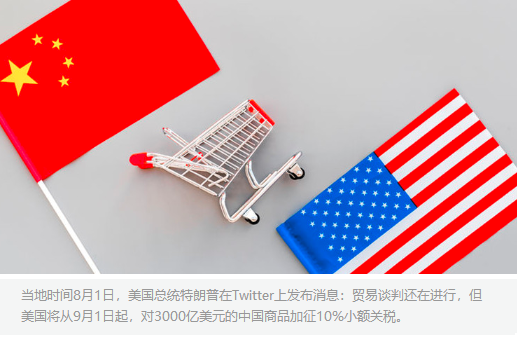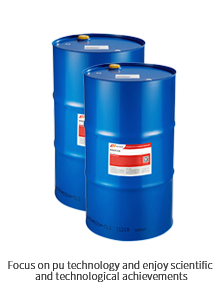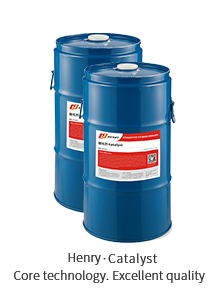 On August 1, President Trump announced that the United States would impose a 10% tariff on $300 billion worth of products imported from China on September 1. On August 2, a spokesman for the Ministry of Commerce made a speech on the US side's move, expressing strong dissatisfaction and resolute opposition. As for China's chemical industry, after the escalation of the Sino-US trade war, the new tax increase list will undoubtedly include some chemical products that have not been included in the original list, which will have a certain impact on the trade chain of the industry.
On August 1, President Trump announced that the United States would impose a 10% tariff on $300 billion worth of products imported from China on September 1. On August 2, a spokesman for the Ministry of Commerce made a speech on the US side's move, expressing strong dissatisfaction and resolute opposition. As for China's chemical industry, after the escalation of the Sino-US trade war, the new tax increase list will undoubtedly include some chemical products that have not been included in the original list, which will have a certain impact on the trade chain of the industry.
From the US Trade Representative's (USTR) tax increase list on June 14, it is not difficult to find that 13 inorganic chemicals including arsenic acid and barium oxide, 95 organic chemicals including vinyl chloride, glycerin and diethyl phosphite, disperse blue 30 and its related preparations, benzoxazole and other five dyes. Intermediates, 17 kinds of essential oils such as orange essential oil and citrus essential oil, toiletries, soap and candle, 14 kinds of protein substances such as casein and fish gum, 12 kinds of explosives such as fireworks and tetramethylaldehyde, fireworks and flammable materials, 19 kinds of miscellaneous chemical products such as stearic acid, oleic acid, DDT, 35 kinds of plastics such as gloves and photo albums. Material and its products, medical gloves, rubber and other 12 kinds of rubber and its products are in the list. In the whole tax increase list, there are a large number of daily products, which will have an impact on the chemical trade chain.
On August 2, a spokesman for the Ministry of Commerce made a speech on the US plan to impose a 10% tariff on 300 billion US dollars of Chinese goods imported from the United States. He said that the move seriously violated the consensus of the meeting between the two heads of state in Osaka, deviated from the correct track and was not conducive to solving the problem. China was strongly dissatisfied and firmly opposed to it. If the U.S. tariff measures are implemented, China will have to take necessary counter-measures to firmly safeguard the core interests of the country and the fundamental interests of the people. All the consequences will be borne by the U.S.
Since the list covers a large number of daily necessities, the tax increase list was opposed by people from all walks of life in the United States at the beginning of its publication. In late June, USTR held a hearing on the proposed tariff increase on some $300 billion of Chinese goods. At the meeting, 303 of 314 delegates spoke against the tariff increase, accounting for 96%. It is generally believed in the American industry that tariff increases will damage American employment and economy and directly impact American consumers.
Other countries and regional economists also opposed the U.S. move. On August 2, the Federation of German Industries said the new threat of tariffs imposed by the U.S. government on China was "worrisome" and would harm many interests, including Germany. Stefan Mayer, a member of the management of the Federation of German Industries, said that the escalation of economic and trade frictions would not only damage the economies of China and the United States, but also damage German industry and the global economy.
The global market reacted strongly to the tariff increase. Before Trump's announcement of tariff increases, U.S. stocks had risen by more than 300 points due to interest rate cuts by the Federal Reserve. After Trump announced the imposition of tariffs, the three major U.S. stock indexes closed down, falling more than 300 points, with a sharp drop of 600 points. Stock indices in the Asia-Pacific region also suffered from this impact and fell.
The crude oil market has also suffered a setback. As of Thursday's close, the price of light crude oil futures delivered on the New York Mercantile Exchange in September fell nearly 8% to close at $53.95 a barrel, the biggest drop since February 2015. Brent crude oil futures for October delivery in London, UK, fell nearly 7% to close at $60.5 a barrel.
label:









 Home
Home On August 1, President Trump announced that the United States would impose a 10% tariff on $300 billion worth of products imported from China on September 1. On August 2, a spokesman for the Ministry of Commerce made a speech on the US side's move, expressing strong dissatisfaction and resolute opposition. As for China's chemical industry, after the escalation of the Sino-US trade war, the new tax increase list will undoubtedly include some chemical products that have not been included in the original list, which will have a certain impact on the trade chain of the industry.
On August 1, President Trump announced that the United States would impose a 10% tariff on $300 billion worth of products imported from China on September 1. On August 2, a spokesman for the Ministry of Commerce made a speech on the US side's move, expressing strong dissatisfaction and resolute opposition. As for China's chemical industry, after the escalation of the Sino-US trade war, the new tax increase list will undoubtedly include some chemical products that have not been included in the original list, which will have a certain impact on the trade chain of the industry.
